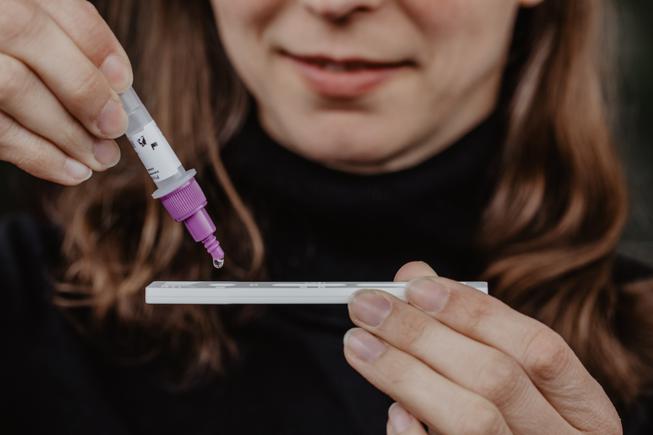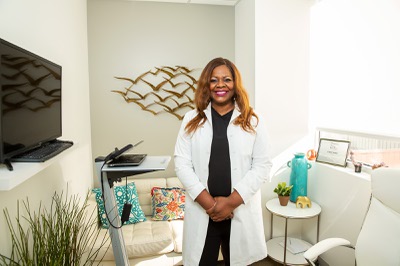
Shutterstock photo illustration
A woman tests herself for COVID-19 using a self-test at home.
Sunday, Jan. 16, 2022 | 2 a.m.
A social media trend of putting at-home COVID-19 tests under tap water to trigger a positive result spreads false information, wastes scarce tests and needs to stop, says one Las Vegas virologist.
Dr. Cindy Duke said she didn’t know what moved the TikTok user to kick-start the trend, but she said it’s clear that the Food and Drug Administration says to only use the rapid antigen tests as directed — and that means nasal swab only.
“What that spurred was a lot of people who maybe are just already sort of inclined to believe conspiracies watching it, repeating it and saying, ‘It’s true, COVID’s in our water,’” said Duke, who is dually board-certified as a virologist and obstetrician-gynecologist.
The trend hopped from TikTok to Instagram, WhatsApp and other social platforms. It also shows people swabbing their throats and coating the swabs with saliva, which is appropriate for some PCR, or molecular, tests but not antigen tests, which detect the disease differently.
Using tap water confuses the tests because other chemical compounds in treated drinking water changes the pH of the test’s substrate, she said.
A 2-minute video titled “Tap water tests positive for covid” was viewed 14.3 million times on TikTok before it was deleted by the social media company. It showed a home experiment to produce false positive results by running the testing devices under tap water.
British surgeon and TikTok influencer Dr. Karan Raj explained how the test misuse works, in a widely viewed — but not as widely-viewed as the original — video of his own.
“This gray box and the portion just above it contain antibodies that are sensitive to the COVID-19 virus,” Raj said. “If you use things like soda, tap water and fizzy drinks, that’s going to provide an altered pH which will affect the function of the antibodies on the test line.”
Canadian microbiologist Dr. Jason LeBlanc was part of a study that showed that rapid antigen tests work only when manufacturer instructions are followed. He told Newsweek that the reason for the study was to demonstrate “the putatively obvious” regarding the amount of false-positive tests going viral by covering them with soda or fruit.
“Seeing the misuse and misrepresentation of the test function on social media, we felt compelled to derive robust scientific data to explain the formation of false-positive results during SARS-CoV-2 antigen testing,” LeBlanc said.
Duke said misinformation could root in a kernel of truth — for example, the confirmed presence of COVID-19 in sewage, as patients shed the virus in their feces. But wastewater is not tap water.
“That’s the whole thing about a conspiracy. Someone sees a video or something that’s gone viral and then they quickly Google they’ll find something that has some modicum of truth,” Duke said.
She added, people will think, ‘“the rest of the story must be true because here’s something that seems related to this. They’re keeping stories from us.’”
Duke said she had explained to her patients and followers on Instagram, Facebook, Twitter and Clubhouse, an audio app, why they should only use rapid antigen tests as directed. But she has stopped short of demonstrating using actual tests because they are in such short supply during this wave drive by the omicron variant.
Gov. Steve Sisolak announced last week that the state had ordered more than half a million at-home COVID-19 rapid antigen tests, paid for with federal pandemic relief funds. They should be available toward the end of the month, with more to come.
President Joe Biden also announced the federal government would distribute a billion at-home tests across the country free of charge. Private health insurers are required to cover up to eight at-home tests, per insured person, per month, under a directive that took effect Saturday.
The expected increase in supply comes after weeks of struggles for many residents, as drug store shelves and websites are often sold out of the at-home tests, and community testing sites are overwhelmed with long waits. That was the scene last week at Sam Boyd Stadium, where the line of cars was so massive it prevented residents who live near the stadium from getting home.
Those who can get tested are showing infection in record numbers. The Southern Nevada Health District reported more than 6,100 new cases in Clark County on Jan. 8, the highest single-day change since the pandemic started. On Thursday, the day-over-day number was about 5,600; in the last week, Clark County has seen close to 25,000 new cases, SNHD data show.

